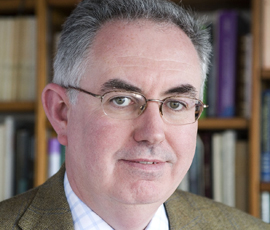Queen Mary researchers play key role in securing £4.3m funding for e-health research centre of excellence in London
Researchers from Barts and the London School of Medicine and Dentistry at Queen Mary, University of London have played a key role in securing a £4.3m award to establish an e-health research Centre of Excellence in London.

Professor Mark Caulfield
The Centre will be one of four (the others are in Manchester, Dundee and Swansea) and the total investment of £19m was announced on Thursday 2 August by David Willetts, Minister for Universities and Science. Funding comes from a consortium of 10 UK government and charity funders.
Professor Mark Caulfield, Director of the William Harvey Research Institute and the NIHR Cardiovascular Biomedical Research Unit, at the Barts and the London Centre for Clinical Pharmacology, who led the QM team involved in the bid, said: “This is a very good result for us and we have won the funding against stiff competition from other top universities.”
The London Centre is a partnership between Queen Mary, University of London, University College London (UCL), UCL Partners, the London School of Hygiene and Tropical Medicine and the Health Protection Agency. It will be known as the Centre for Health Service and Academic Partnership in Translational E-Health Research (CHAPTER) and will open later this year.
The Centre will harness the wealth of information contained within the UK’s electronic health records to improve patient care and public health, particularly in the areas of cardiovascular disease, cancer, and child and maternal health.
Professor Caulfield and his colleagues Professor Adam Timmis and Dr Steffen Petersen, both from the William Harvey Research Institute, and Dr John Robson from the Blizard Institute, put together the key part of the bid, which related to cardiovascular research.
“We propose to use electronic health records to identify those patients who would most benefit from specific interventions and participation in clinical trials,” explained Professor Caulfield. “Using the e-health records will enable us to have a targeted approach, so that we can find the right patients to take part in the right trials and improve efficiency so new medicines can reach patients quicker”.
“One example of how we can do this is to create a London atlas of cardiovascular disease. This would include anonymised data from patients’ health records and would be available on the internet for researchers to use.”
The Centre, together with the other three, will make use of patient data sets available through the Clinical Practice Research Datalink, a £60m service recently announced by the Medicines and Healthcare Products Regulatory Agency and the National Institute for Health Research.
Public understanding of the importance of using health data for research is crucial to advancing drug discovery and improving patient care. The new Centres will play an active role in engaging with the public to promote better understanding of the benefits of e-health records research. The Centres will also act as a vital point of contact for industry, the NHS and policy makers.
The funding will provide a couple of PhD student posts at Queen Mary and training to develop methodology to improve use of the electronic records and to carry out the research itself.
Announcing the award, Mr Willetts said: “Thanks to the NHS and the UK’s world-leading research base, we are uniquely positioned to use patient data to study disease and develop better treatments. The e-health centres are the first of their kind and have the potential to revolutionise health research. They will provide a vital insight into conditions affecting millions of people and ultimately bring benefits for patients.”
The members of the E-Health Research Initiative who have jointly-funded the four Centres are: Arthritis Research UK, the British Heart Foundation, Cancer Research UK, the Chief Scientist Office (Scottish Government Health Directorates), the Economic and Social Research Council, the Engineering and Physical Sciences Research Council, the Medical Research Council, the National Institute for Health Research, the National Institute for Social Care and Health Research (Welsh Government) and the Wellcome Trust.
Related items

11 December 2024

5 December 2024

2 December 2024
For media information, contact: